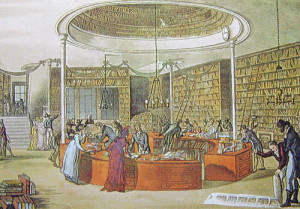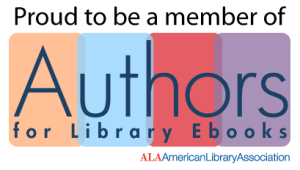Aren’t we lucky that books are so available to us? Today we have so many choices. Hardback books, paperback books, ebooks. We can buy books online, in mega-bookstores, small independent bookstores, stores like Target and Walmart, even grocery stores. And we can borrow books from libraries.
 The invention of the printing press paved the way for making books available to more than the rare few, but even three hundred years later, during the Regency, only the wealthy could afford to buy books. A book in three volumes could cost almost one hundred dollars in today’s dollars. Books were much more affordable when lent from the circulating libraries that abounded in every English city and village.
The invention of the printing press paved the way for making books available to more than the rare few, but even three hundred years later, during the Regency, only the wealthy could afford to buy books. A book in three volumes could cost almost one hundred dollars in today’s dollars. Books were much more affordable when lent from the circulating libraries that abounded in every English city and village.
Some were as large and well-stocked as Hookham’s on Bond Street. Others, in villages, might consist of a couple shelves of books in a dry goods shop. Subscriptions could cost a guinea a year to borrow as many books as one wished at the more expensive libraries to a few pence per book at the smaller ones.
One thing was certain at the circulating libraries of all sizes. Novels were by far the most popular books borrowed.
It is true today, as well. The most popular category of books borrowed in libraries are novels.
Today libraries are struggling to meet the needs of our changing world, especially the changing world of publishing and the effects of the economic crisis. Budgets are being cut at the same time that new technologies are becoming more and more important.
 One of the struggles involves the borrowing of ebooks. Instead of ebooks making books more accessible through libraries, the cost of ebooks, sometimes 150-500% above printed books, has made it more difficult for libraries to afford the numbers of books they might have stocked on bookshelves. In response The American Library Association has announced the launch of “Authors for Library Ebooks,” an initiative that asks authors to stand with libraries in their quest for equitable access to e-books. Kicking off the campaign are bestselling authors Cory Doctorow, Ursula K. Le Guin and Jodi Picoult. Authors can sign on to this initiative here.
One of the struggles involves the borrowing of ebooks. Instead of ebooks making books more accessible through libraries, the cost of ebooks, sometimes 150-500% above printed books, has made it more difficult for libraries to afford the numbers of books they might have stocked on bookshelves. In response The American Library Association has announced the launch of “Authors for Library Ebooks,” an initiative that asks authors to stand with libraries in their quest for equitable access to e-books. Kicking off the campaign are bestselling authors Cory Doctorow, Ursula K. Le Guin and Jodi Picoult. Authors can sign on to this initiative here.
The ALA has been talking to major publishers, distributors, authors and agents about solutions for library ebook lending, a solution that can be fair to everyone. I think it is so important that libraries survive to offer books to those who cannot afford them and that will include ebooks more and more as epublishing grows.
What do you think?
And….Our Elena Greene is interviewed at History Hoydens today. Let’s show her some Risky Regencies support!! (and hear more about Flying With A Rogue!)
This just in! Number One London is planning a Wellington Tour! Check it out!

Thanks Diane for posting this. This is SO IMPORTANT. About 90% of the women who come into my public library with a new tablet (Kindle Fire, iPad, etc.) want to check out romances. Many of them simply want to read an author first (free sample idea) before deciding to buy. Many are just getting used to technology so they don’t understand the idea (yet) of having a B&N or Amazon account (for the free samples), but they DO understand checking out a library book to try out a new author. So,the more authors and new authors that libraries can AFFORD to buy (and then circulate) as ebooks, the better of all authors will be… it is a win-win for everyone. Thanks!
I’m happy to mention this. It is so important.
I agree with this in concept, however, I haven’t had the time to research the practical aspects. Clearly I need to get up to speed. Thanks for the link!
It makes sense to me that libraries should not pay more for ebooks, but I think there should be some limit on how many borrowings the book gets before another needs to be ordered.
Maybe that’s part of it. I wish the link you provided were more specific. So far I’ve only borrowed paper books, so I don’t know how ebook loans are managed. But I think there would need some way to control how many books can be downloaded at a time and overall. This could easily become another source of piracy–not that one can completely control it, but you don’t have to make it easy.
What a great blog, Diane! I could never have done without libraries in my life–the importance of them to me can’t be overstated. My own library system here is just starting with ebook loaning, and they have a few bugs to work out, but I think it will be great in the end. They limit the number of borrowings, so if the book you want is already checked out to other devices you have to get on the reserve list, just like a print book…